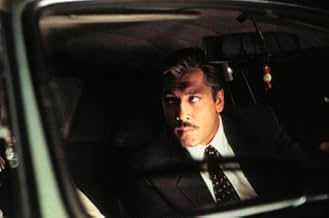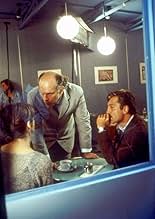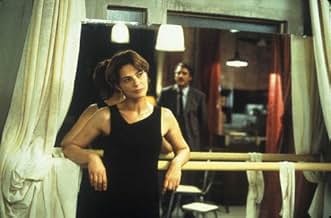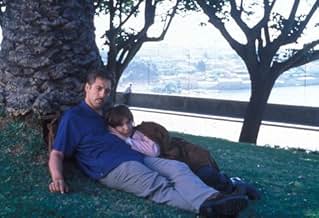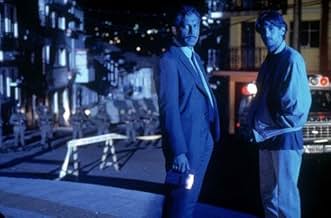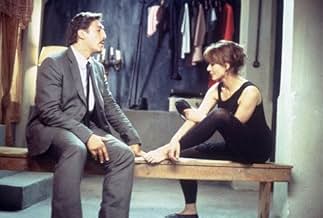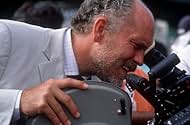IMDb रेटिंग
6.9/10
7.1 हज़ार
आपकी रेटिंग
अपनी भाषा में प्लॉट जोड़ेंA police detective in a South American country is dedicated to hunting down a revolutionary guerilla leader.A police detective in a South American country is dedicated to hunting down a revolutionary guerilla leader.A police detective in a South American country is dedicated to hunting down a revolutionary guerilla leader.
- पुरस्कार
- 1 जीत और कुल 3 नामांकन
फ़ीचर्ड समीक्षाएं
Acclaimed actor John Malkovich has made his directorial debut with an assured political thriller that combines tension and intelligence to make for a gripping two and a quarter hours. The setting is a South American country which is unnamed, but the clear inspiration for the storyline is the early 1990s experience of Peru (which I have recently visited) when the bizarre Abimael Guzman led the murderous Shining Path movement, while the movie was shot in Spain, Portugal and Ecuador.
Javier Bardem plays Augustin Rejas, a former lawyer turned policeman who manages rare dignity and honesty as he battles with the interventions of a regime teetering on the edge of a military dictatorship and the pursuit of a fanatical revolutionary codenamed Ezekiel, while struggling with the varying emotions associated with a vapid wife, an adoring daughter, and his daughter's dance teacher, the eponymous and allurring woman upstairs (Laura Morante as Yolanda). Bardem - who reminds me of an early Raul Julia - gives a languid yet charismatic performance and hopefully we will see much more of this talented actor.
In some respects the work is reminiscent of Costa-Gavras's "State Of Siege", a clip of which is actually used here. However, the movie is based on a novel by the British writer Nicholas Shakespeare, who wrote the screenplay which features some conversation in Quechua (a native language of Peru and Bolivia), and this is a more personal examination of terrorism than the 1973 movie.
Javier Bardem plays Augustin Rejas, a former lawyer turned policeman who manages rare dignity and honesty as he battles with the interventions of a regime teetering on the edge of a military dictatorship and the pursuit of a fanatical revolutionary codenamed Ezekiel, while struggling with the varying emotions associated with a vapid wife, an adoring daughter, and his daughter's dance teacher, the eponymous and allurring woman upstairs (Laura Morante as Yolanda). Bardem - who reminds me of an early Raul Julia - gives a languid yet charismatic performance and hopefully we will see much more of this talented actor.
In some respects the work is reminiscent of Costa-Gavras's "State Of Siege", a clip of which is actually used here. However, the movie is based on a novel by the British writer Nicholas Shakespeare, who wrote the screenplay which features some conversation in Quechua (a native language of Peru and Bolivia), and this is a more personal examination of terrorism than the 1973 movie.
'The Dancer Upstairs' marks John Malkovich's debut as a film director, but it's hardly his first time in the director's chair: Malkovich was a charter member of the now-prestigious Steppenwolf Theater Company in Chicago, where he split time between acting and directing, developing the versatility that has earned him regard as one of the best character actors in the business. He brings a stage director's consciousness to this fine, unexpectedly suspenseful and complex thriller, a fictionalized dramatization of events surrounding the rise and fall of the Shining Path revolutionary movement in Peru.
In the lead role of Detective Augustin Rejas is Javier Bardem, already an established star in his native Spain who is gaining increasingly wide notice in the US for his award-winning turns in Julian Schnabel's 'Before Night Falls' (2002) and Alejandro Amenabar's 'The Sea Inside' (2004). Bardem, like Malkovich, is a wonderfully versatile actor, and this film offers him another fine opportunity to display his range as Rejas, an idealistic police detective who abandoned a promising career as a trial lawyer in the hope that he might be able to work within the system to heal the corruption of his native country (left unnamed, though the story clearly borrows from actual events in Peru).
The film opens on the high plains at the foothills of the Andes, with Rejas working at a highway checkpoint station. He encounters a vehicle bearing a mysterious undocumented passenger. While Rejas follows procedure, his colleague accepts a bribe, and allows the vehicle to flee the scene.
Years later, Rejas has advanced through the ranks and now works as a detective in the nation's coastal capital. He and his partner Sucre (Juan Diego Botto, making the most of a small role) gradually begin to discover evidence of a burgeoning revolutionary movement led by the enigmatic 'Presidente Ezequiel,' whom Rejas eventually realizes to be the same man he met briefly years earlier at the mountain checkpoint. The followers of Ezequiel--a former college professor and Marxist who went underground ten years earlier to foment a 'fourth wave' of communist revolution (the first three being the USSR, China, and Cuba)--begin to terrorize the capital and outlying regions with suicide bombings and brutal assassinations. Rejas must uncover the secret of Ezequiel before the President enacts martial law and turns the government into another version of the brutal dictatorships previously seen in Bolivia, Chile, and Argentina.
As the Ezequiel mystery deepens, Rejas begins to develop an infatuation with his daughter's ballet instructor, Yolanda (Laura Morante), with who he shares an unspoken bond and who seems to be an attractive alternative to his own wife (Alexandre Lencastre), a sweet but superficial woman who obsesses over fashion magazines and makeup and begs her perpetually broke husband to let her get a nose job. Rejas begins to court Yolanda, and as he becomes more deeply involved with her, he begins to discover evidence that she may be knowingly or unknowingly connected in some way to Ezequiel.
The political dimension of the story is fascinating, but the main source of conflict is the interior world of Rejas, a sensitive, morally decent man who is torn between his faith in the law and his sympathy for the people who suffer at the hands of corrupt government officials. Rejas is also torn between his sense of honor and decency and his profound emotional attraction to Yolanda. It's a tough role to pull off, and Malkovich gives Bardem the time and opportunity to draw the character's emotional complexity with subtle, patient, expressive moments and line deliveries. Bardem has the rare ability to convey distinct emotions or states of thought with subtle gestures and nuanced facial expressions, and Malkovich demonstrates an actor's trust in another gifted actor to accomplish the film's emotional subtext.
There are a few problems here and there. Rejas' attraction to Yolanda is understandable, but their burgeoning relationship feels a bit forced and underdeveloped at times. A subplot involving the Chinese embassy is introduced but left more or less unresolved. The plot is vaguely predictable, though, in the film's defense, the suspense has more to do with how Rejas will deal with the revelations his investigation will uncover than with what will actually be revealed.
Even with the flaws, 'The Dancer Upstairs' is a highly intelligent and entertaining film, and offers yet another opportunity for American audiences to become acquainted with the fabulously talented Javier Bardem, who is my pick to be the next Marlon Brando.
In the lead role of Detective Augustin Rejas is Javier Bardem, already an established star in his native Spain who is gaining increasingly wide notice in the US for his award-winning turns in Julian Schnabel's 'Before Night Falls' (2002) and Alejandro Amenabar's 'The Sea Inside' (2004). Bardem, like Malkovich, is a wonderfully versatile actor, and this film offers him another fine opportunity to display his range as Rejas, an idealistic police detective who abandoned a promising career as a trial lawyer in the hope that he might be able to work within the system to heal the corruption of his native country (left unnamed, though the story clearly borrows from actual events in Peru).
The film opens on the high plains at the foothills of the Andes, with Rejas working at a highway checkpoint station. He encounters a vehicle bearing a mysterious undocumented passenger. While Rejas follows procedure, his colleague accepts a bribe, and allows the vehicle to flee the scene.
Years later, Rejas has advanced through the ranks and now works as a detective in the nation's coastal capital. He and his partner Sucre (Juan Diego Botto, making the most of a small role) gradually begin to discover evidence of a burgeoning revolutionary movement led by the enigmatic 'Presidente Ezequiel,' whom Rejas eventually realizes to be the same man he met briefly years earlier at the mountain checkpoint. The followers of Ezequiel--a former college professor and Marxist who went underground ten years earlier to foment a 'fourth wave' of communist revolution (the first three being the USSR, China, and Cuba)--begin to terrorize the capital and outlying regions with suicide bombings and brutal assassinations. Rejas must uncover the secret of Ezequiel before the President enacts martial law and turns the government into another version of the brutal dictatorships previously seen in Bolivia, Chile, and Argentina.
As the Ezequiel mystery deepens, Rejas begins to develop an infatuation with his daughter's ballet instructor, Yolanda (Laura Morante), with who he shares an unspoken bond and who seems to be an attractive alternative to his own wife (Alexandre Lencastre), a sweet but superficial woman who obsesses over fashion magazines and makeup and begs her perpetually broke husband to let her get a nose job. Rejas begins to court Yolanda, and as he becomes more deeply involved with her, he begins to discover evidence that she may be knowingly or unknowingly connected in some way to Ezequiel.
The political dimension of the story is fascinating, but the main source of conflict is the interior world of Rejas, a sensitive, morally decent man who is torn between his faith in the law and his sympathy for the people who suffer at the hands of corrupt government officials. Rejas is also torn between his sense of honor and decency and his profound emotional attraction to Yolanda. It's a tough role to pull off, and Malkovich gives Bardem the time and opportunity to draw the character's emotional complexity with subtle, patient, expressive moments and line deliveries. Bardem has the rare ability to convey distinct emotions or states of thought with subtle gestures and nuanced facial expressions, and Malkovich demonstrates an actor's trust in another gifted actor to accomplish the film's emotional subtext.
There are a few problems here and there. Rejas' attraction to Yolanda is understandable, but their burgeoning relationship feels a bit forced and underdeveloped at times. A subplot involving the Chinese embassy is introduced but left more or less unresolved. The plot is vaguely predictable, though, in the film's defense, the suspense has more to do with how Rejas will deal with the revelations his investigation will uncover than with what will actually be revealed.
Even with the flaws, 'The Dancer Upstairs' is a highly intelligent and entertaining film, and offers yet another opportunity for American audiences to become acquainted with the fabulously talented Javier Bardem, who is my pick to be the next Marlon Brando.
I would expect a movie directed by John Malkovich to be intense and specific. The Dancer Upstairs is that. It is a political movie that while popular in Europe, does not tend to draw well in the United States. Too bad.
The story tells the tale of a lawyer who has left the law looking for a better system. I don't know that becoming a police detective is that much better, but it serves the story. The story is set in a nameless Latin American country -- which also suits the story line.
Detective Lt. Agustín Rejas (Javier Bardem) has left a law firm where he was a junior partner, to join law enforcement -- with a conscious. He can give a break to a traveler whose papers are not quite right and he can be relentless in his pursuit of a terrorist.
Rejas has been victimized by the politics of his country. His father lost his coffee farm to the soldiers. His view of the judicial system has seen a rapist become president of the country. But still, Rejas finds joy in his beautiful dancer daughter and his wife -- who has a political mission of her own. Then he meets the free spirited dance instructor for his daughter.
Rejas works in a corrupt society where the fiscal corruption goes hand in hand with the moral and political corruption. The central government is all too ready to suspend civil rights and to put military law into effect. The military killing innocent people is fine as long as it suits the party.
Rejas attempts to live the just life and must deal with the corruption the best he can. This conflict is the heart of the movie. As he says, he has feelings about his father losing his farm and he is the Gary Cooper type.
Javier Bardem is excellent in the pivotal role. Juan Diego Botto does a very credible job as Detective Sgt. Sucre. Laura Morante is intoxicating as dance instructor focal point of the story.
I give this move a 9 for great story and suspense, excellent direction and fine acting. There is no sex and very brief nudity. The violence does tend to be horrific and there are depictions of cruelty to animals -- both central to the plot. This is far less than the typical Jason or Chainsaw movies gore.
I consider this an excellent direction debut for John Malkovich and look forward to his next feature film effort. It feels like Malkovich will fill a role similar to Robert Redford in films he has directed.
The story tells the tale of a lawyer who has left the law looking for a better system. I don't know that becoming a police detective is that much better, but it serves the story. The story is set in a nameless Latin American country -- which also suits the story line.
Detective Lt. Agustín Rejas (Javier Bardem) has left a law firm where he was a junior partner, to join law enforcement -- with a conscious. He can give a break to a traveler whose papers are not quite right and he can be relentless in his pursuit of a terrorist.
Rejas has been victimized by the politics of his country. His father lost his coffee farm to the soldiers. His view of the judicial system has seen a rapist become president of the country. But still, Rejas finds joy in his beautiful dancer daughter and his wife -- who has a political mission of her own. Then he meets the free spirited dance instructor for his daughter.
Rejas works in a corrupt society where the fiscal corruption goes hand in hand with the moral and political corruption. The central government is all too ready to suspend civil rights and to put military law into effect. The military killing innocent people is fine as long as it suits the party.
Rejas attempts to live the just life and must deal with the corruption the best he can. This conflict is the heart of the movie. As he says, he has feelings about his father losing his farm and he is the Gary Cooper type.
Javier Bardem is excellent in the pivotal role. Juan Diego Botto does a very credible job as Detective Sgt. Sucre. Laura Morante is intoxicating as dance instructor focal point of the story.
I give this move a 9 for great story and suspense, excellent direction and fine acting. There is no sex and very brief nudity. The violence does tend to be horrific and there are depictions of cruelty to animals -- both central to the plot. This is far less than the typical Jason or Chainsaw movies gore.
I consider this an excellent direction debut for John Malkovich and look forward to his next feature film effort. It feels like Malkovich will fill a role similar to Robert Redford in films he has directed.
It's Latin America in the Recent Past. Agustín Rejas (Javier Bardem) is a Sergeant manning a road check. The country is corrupt with a militaristic Presidency. Rejas is a former lawyer ready for a promotion in the capital. A mysterious man with others and a dead dog in a truck escape the checkpoint. Then it's five years later. He's a police Lieutenant. With his young partner Sucre (Juan Diego Botto), he's investigating a mysterious revolutionary group led by Ezequiel. They hang dogs from the lamp posts. The violence escalates as leaders get assassinated. Yolanda (Laura Morante) is Rejas' daughter Laura's dance teacher. He begins an affair with her as he suspects her connection to Ezequiel.
The non-specificity of the time and place could have been improved by weaving the real story into this movie. It doesn't have to be perfect and most movies aren't real biographies anyways. The great aspect of this is Bardem and the sense of Latin America that this projects. John Malkovich is directing for the first time and he shows some competency. It is well-made and most importantly, he focuses on Bardem. The story does leave some questions. The ballet teacher's connections to everyone is very convenient. The investigation is not that clear. I don't know how nebulous the book is but adapting may have left something out of the movie. It would help to have great clarity, and better intensity.
The non-specificity of the time and place could have been improved by weaving the real story into this movie. It doesn't have to be perfect and most movies aren't real biographies anyways. The great aspect of this is Bardem and the sense of Latin America that this projects. John Malkovich is directing for the first time and he shows some competency. It is well-made and most importantly, he focuses on Bardem. The story does leave some questions. The ballet teacher's connections to everyone is very convenient. The investigation is not that clear. I don't know how nebulous the book is but adapting may have left something out of the movie. It would help to have great clarity, and better intensity.
A curious but not entirely unexpected idiossyncratic choice from John Malkovich for his directing debut, this adaptation of Nicholas Shakespeare's novel fictionalising the capture of the leader of the Peruvian Shining Path revolutionary movement is a more pensive, less political throwback to the European "political thrillers" of the 1970s made popular by directors such as Costa-Gavras. Malkovich, however, dislocates the film's centre from politics into personal mores, following the story of Javier Bardem, as the police detective assigned to discover the whereabouts of the mysterious terrorist leader "Ezequiel". In a superbly controlled performance, Bardem emphasizes the vulnerability of this disenchanted, seen-it-all cop thrown against his will into the frying-pan and the way he attempts to maintain his dignity and uphold the law he no longer believes in. Malkovich proves an engaging director - despite its lengthy running time (and although it could use a slight trim), the film is neither predictable nor overstays its welcome, and the actors deliver consistently good performances. One wishes Malkovich had looked for a better story to tell, but as debuts go this is a promising one.
क्या आपको पता है
- ट्रिवियाThe story is inspired by the Maoist insurgency in Peru known as the Shining Path. Its leader Abimael Guzmán, who was known by the nom de guerre President Gonzalo, was captured in an apartment above a ballet studio in the capital city of Lima in 1992. The ballet teacher Yolanda was based on Maritza Garrido Lecca, the woman in whose apartment Guzmán was found. Bardem's character was inspired by Benedicto Jimenez and Gen. Antonio Ketin Vidal, the leading figures responsible for Guzmán's capture.
- गूफ़When Sucre & Llosa arrest the young woman in orange, she has been handcuffed to the ceiling of the car. But then en route, soldiers simply drag her out of the backseat. No handcuff keys. No bolt cutters.
- भाव
Agustín Rejas: I'd like to have a list of staff with access to the President's chambers.
Calderón: Luckily there are only two of them. The first is named 'Fuck', the second is named 'Off'.
- क्रेज़ी क्रेडिटThe producers would like to thank ... the residents of Narcisos Street ...
- कनेक्शनFeatured in Revealing 'The Dancer Upstairs' (2003)
- साउंडट्रैकViagens Interditas
(1995)
Written by Pedro Malgheas (as Pedro Ayres) and Rodrigo Leão
Performed by Madredeus
Licensed by Dpte. de Productos Especiales de
(p) EMI Odean, S.A., Madrid, Spain, 2001 exclusive rights holder
टॉप पसंद
रेटिंग देने के लिए साइन-इन करें और वैयक्तिकृत सुझावों के लिए वॉचलिस्ट करें
- How long is The Dancer Upstairs?Alexa द्वारा संचालित
विवरण
बॉक्स ऑफ़िस
- US और कनाडा में सकल
- $23,77,348
- US और कनाडा में पहले सप्ताह में कुल कमाई
- $1,06,142
- 4 मई 2003
- दुनिया भर में सकल
- $52,27,348
- चलने की अवधि
- 2 घं 12 मि(132 min)
- रंग
- ध्वनि मिश्रण
- पक्ष अनुपात
- 1.85 : 1
इस पेज में योगदान दें
किसी बदलाव का सुझाव दें या अनुपलब्ध कॉन्टेंट जोड़ें



